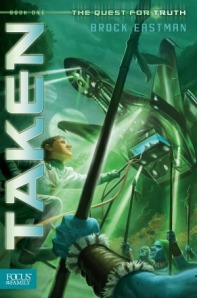 For me, some of C. S. Lewis’s most memorable lines, images, and scenes are in his Narnia tales. I want to share one of my favorites from Prince Caspian, the perfect illustration of “trust and obey,” and more.
For me, some of C. S. Lewis’s most memorable lines, images, and scenes are in his Narnia tales. I want to share one of my favorites from Prince Caspian, the perfect illustration of “trust and obey,” and more.
Peter, Susan, Edmund, and Lucy return to Narnia a year after they had become kings and queens in Aslan’s world. But everything is changed. The animals no longer talk–at least most don’t–and the people have forgotten Aslan.
Eventually, with the help of a Dwarf named Trumpkin, they realize that hundreds of years, perhaps a thousand, have passed during their earth year. To put things to rights, they aim to join up with Prince Caspian who believes in the old stories.
To reach him, they must cross a river which is now in a deep gorge. They are discussing how to navigate around this obstacle, then this:
“Look! Look! Look!” cried Lucy.
“Where? What?” asked everyone.
“The Lion,” said Lucy. “Aslan himself. Didn’t you see?” Her face had changed completely and her eyes shone.
“Do you really mean–” began Peter.
“Where did you think you saw him?” asked Susan.
“Don’t talk like a grown-up,” said Lucy, stamping her foot. “I didn’t think I saw him. I saw him.”
“Where, Lu?” asked Peter.
“Right up there between those mountain ashes. No, this side of the gorge. And up, not down. Just the opposite of the way you wanted to go. And he wanted us to go where he was–up there.”
“How do you know that was what he wanted?” asked Edmund.
“He–I–I just know,” said Lucy, “by his face.”
The others all looked at each other in puzzled silence.
“Her Majesty may well have seen a lion,” put in Trumpkin. “There ae lions in these woods, I’ve been told. But it needn’t have been a friendly and talking lion any mor than the ear was a friendly and talking bear.”
“Oh, don’t be so stupid,” said Lucy. “Do you think I don’t know Aslan when I see him?
Eventually the five of them take a vote and choose to make their way downstream. After a hard march they encounter an enemy force and turn back. They camp, but during the night, Lucy hears someone call her name. She gets up and makes her way to a clearing where she finds Aslan.
“Aslan, Aslan. Dear Aslan,” sobbed Lucy. “At last.”
The great beast rolled over on his side so that Lucy fell, half sitting and half lying between his front paws. He bent forward and just touched her nose with his tongue. His warm breath came all round her. She gazed up into the large wise face.
“Welcome, child,” he said.
“Aslan,” said Lucy,”you’re bigger.”
“That is because you are older, little one,” answered he.
“Not because you are?”
“I am not. But every year you grow, you will find me bigger.”
For a time she was so happy that she did not want to speak. But Aslan spoke.
“Lucy,” he said, “we must not lie her for long. You have work in hand, and much time has been lost today.”
“Yes, wasn’t it a shame?” said Lucy. “I saw you all right. They wouldn’t believe me. They’re all so–”
From somewhere deep inside Aslan’s body there came the faintest suggestion of a growl.
“I’m sorry,” said Lucy, who understood some of his moods. “I didn’t mean to start slanging the others. But it wasn’t my fault anyway, was it?”
The Lion looked straight into her eyes.
“Oh, Aslan,” said Lucy. “You don’t mean it was? How could I–I couldn’t have left the others and come up to you alone, how could I? Don’t look at me like that . . . oh, well, I suppose I could. Yes, and it wouldn’t have been alone, I know, not if I was with you. But what would have been the good?”
Aslan said nothing.
“You mean,” said Lucy rather faintly, “that it would have turned out all right–somehow? But how? Please, Aslan! Am I not to know?”
“To know what would have happened, child?” said Aslan. “No. Nobody is ever told that.”
“Oh, dear,” said Lucy.”
“But anyone can find out what will happen,” said Aslan. “If you go back to the others now and wake them up; and tell them you have seen me again; and that you must all get up at once and follow me–what will happen? There is only one way of finding out.”
Do you mean that is what you want me to do?” gasped Lucy.
“Yes, little one,” said Aslan.
“Will the others see you too?” asked Lucy.
Certainly not at first,” said Aslan. “Later on, it depends.”
“But they won’t believe me,” said Lucy.
“It doesn’t matter,” said Aslan.
After Aslan reassures her and fills her with his lion-strength, she says she’s ready and goes to wake up the others. They’re all very sleepy and don’t believe her because they can’t see Aslan themselves.
[Susan said], “She’s been dreaming. Do lie down and go to sleep, Lucy.”
“And I do hope,” said Lucy in a tremulous voice,”that you will all come with me. Because–because I’ll have to go with him whether anyone else does or not.”
“Don’t talk nonsense, Lucy,” said Susan. “Of course you can’t go off on your own. Don’t let her, Peter. She’s being downright naughty.”
“I’ll go with her, if she must go,” said Edmund. She’s been right before.”
“I know she has,” said Peter. “And she may have been right this morning. We certainly had no luck going down the gorge. Still–at this hour of the night. And why should Aslan be invisible to us? He never used to be. It’s not like him.”
At last, despite all the objections, they set off, with Susan complaining the whole time.
Lucy went first, biting her lip and trying not to say all the things she thought of saying to Susan. But she forgot them when she fixed her eyes on Aslan. He turned and walked at a slow pace about thirty yards ahead of them. The others had only Lucy’s directions to guide them, for Aslan was not only invisible to them but silent as well. His big cat-like paws made no noise on the grass . . .
For a long way Aslan went along the top of the precipices. Then they came to a place where some little trees grew right on the edge. He turned and disappeared among them. Lucy held her breath, for it looked as if he had plunged over the cliff; but she was too busy keeping him in sight to stop and think about this. She quickened her pace and was soon among the trees herself. Looking down, she could see a steep and narrow path going slantwise down into the gorge between rocks, and Aslan descending it. He turned and looked at her with his happy eyes. Lucy clapped her hands and began to scramble down after him. From behind her she heard the voices of the others shouting, “Hi! Lucy! Look out, for goodness’ sake. You’re right on the edge of the gorge. Come back–” and then, a moment later Edmund’s voice saying, “No, she’s right. There is a way down.”
 This year marks the 50th anniversary of C. S. Lewis’s death. He, like President John F. Kennedy and author Aldous Huxley, died November 22, 1963. As part of the tribute (over at Spec Faith I’ve already written
This year marks the 50th anniversary of C. S. Lewis’s death. He, like President John F. Kennedy and author Aldous Huxley, died November 22, 1963. As part of the tribute (over at Spec Faith I’ve already written  I’m not actually writing this post about a particular book–it’s more about an idea.
I’m not actually writing this post about a particular book–it’s more about an idea.  A new addition to the list of fantasy authors comes to us from the field of education.
A new addition to the list of fantasy authors comes to us from the field of education. 
 Bethany House is one of the more interesting Christian publishing houses when it comes to speculative fiction. First, they contracted
Bethany House is one of the more interesting Christian publishing houses when it comes to speculative fiction. First, they contracted  I heard some great news this week. Long time CSFF Blog Tour member (he joined in 2007)
I heard some great news this week. Long time CSFF Blog Tour member (he joined in 2007)  In case anyone isn’t noticing, young adult (YA) literature is hot right now, especially fantasy. Following this trend, any number of writers who published adult fiction now write for the YA market. Of late I’ve learned of several children’s book writers who are making the switch too. They may be well-known in one arena, but when they write for a new audience, they, too need an introduction. Such is the case with today’s author — Karyn Henley.
In case anyone isn’t noticing, young adult (YA) literature is hot right now, especially fantasy. Following this trend, any number of writers who published adult fiction now write for the YA market. Of late I’ve learned of several children’s book writers who are making the switch too. They may be well-known in one arena, but when they write for a new audience, they, too need an introduction. Such is the case with today’s author — Karyn Henley. Speculative authors come in all shapes and sizes and from any number of backgrounds, but apparently flying planes stimulates the imagination. Along with former astronaut candidate
Speculative authors come in all shapes and sizes and from any number of backgrounds, but apparently flying planes stimulates the imagination. Along with former astronaut candidate  During the next five years he completed three additional books in the series, and apparently sold enough copies to catch the interest of Multnomah Publishing which reproduced all four titles and contracted two more. Since then, Chuck has added six additional books in the Knights of Arrethtrae series.
During the next five years he completed three additional books in the series, and apparently sold enough copies to catch the interest of Multnomah Publishing which reproduced all four titles and contracted two more. Since then, Chuck has added six additional books in the Knights of Arrethtrae series. Lisa T. Bergren is the author of over thirty books, so you may wonder how it is that she needs an introduction. As it happens, Lisa is somewhat of an eclectic writer — she has books in a variety of genres: non-fiction, romance, historical, suspense, YA.
Lisa T. Bergren is the author of over thirty books, so you may wonder how it is that she needs an introduction. As it happens, Lisa is somewhat of an eclectic writer — she has books in a variety of genres: non-fiction, romance, historical, suspense, YA.  As a child
As a child  At the urging of those who read his work, Brock decided to explore publication. Ultimately he secured a five book contract with P&R Publishing. Taken, a kind of Indiana Jones meets City of Ember story, is the culmination of six years of work.
At the urging of those who read his work, Brock decided to explore publication. Ultimately he secured a five book contract with P&R Publishing. Taken, a kind of Indiana Jones meets City of Ember story, is the culmination of six years of work.
![PowerElementsCharacterDevelopment[1000][1]](https://rebeccaluellamiller.files.wordpress.com/2015/05/powerelementscharacterdevelopment10001.jpg?w=205)







